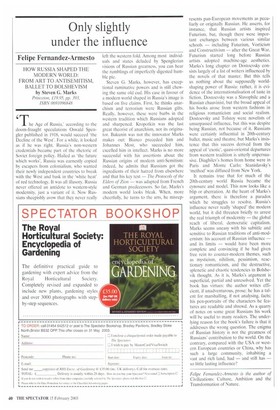Only slightly under the influence
Felipe Fernandez-Armesto
HOW RUSSIA SHAPED THE MODERN WORLD: FROM ART TO ANTISEMITISM, BALLET TO BOLSHEVISM by Steven G. Marks Princeton, £19.95, pp. 393. ISBN 0691096848 The Age of Russia,' according to the doom-fraught speculations Oswald Spengler published in 1918, would succeed 'the Decline of the West'. For a while, it looked as if he was right. Russia's non-western credentials became part of the rhetoric of Soviet foreign policy. Hailed as 'the future which works', Russia was earnestly copied by escapers from colonialism, who wanted their newly independent countries to break with the West and bask in the 'white heat' of red technology. It was all illusory. Russia never offered an antidote to western-style modernity, just a variant of it. Now Russians sheepishly avow that they never really
left the western fold. Among most individuals and states deluded by Spenglerian visions of Russian greatness, you can hear the rumblings of imperfectly digested humble pie.
Steven G. Marks, however, has exceptional ruminative powers and is still chewing the same old cud. His case in favour of a modern world shaped in Russia's image is based on five claims. First, he thinks anarchism and terrorism were Russian gifts. Really, however, these were barbs in the western tradition which Russians adopted and sharpened. Kropotkin was the last great theorist of anarchism, not its originator. Bakunin was not the innovator Marks makes out: Bianco preceded him and Johannes Most, who succeeded him, excelled him in intellect. Marks is no more successful with his assertions about the Russian origins of modern anti-Semitism: indeed, he admits that Russians got the ingredients of their hatred from elsewhere and that his key text — The Protocols of the Elders of Zion — was adapted from French and German predecessors. So far. Marks's modern world looks bleak. When, more cheerfully, he turns to the arts, he misrep resents pan-European movements as peculiarly or originally Russian. He asserts, for instance. that Russian artists inspired Futurism, but, though there were important exchanges between various similar schools — including Futurism, Vorticism and Constructivism — after the Great War, Futurism started long before Russian artists adopted machine-age aesthetics. Marks's long chapter on Dostoevsky consists largely of a list of writers influenced by the novels of that master. But this tells us nothing about the supposedly worldshaping power of Russia: rather, it is evidence of the internationalisation of taste in fiction. Dostoevsky was a Slavophile and a Russian chauvinist, but the broad appeal of his books arose from western fashions in religious romanticism and social realism. Dostoevsky and Tolstoy were novelists of unsurpassed influence, but this was despite being Russian, not because of it. Russians were certainly influential in 20th-century ballet, music and theatre, but Marks's insistence that this success derived from the appeal of 'exotic', quasi-oriental departures from western tradition is utterly unpersuasive. Diaghilev's homes from home were in Paris and Monte Carlo; Stanislavsky's 'method' was diffused from New York.
It remains true that for much of the 20th-century world Russia became the cynosure and model. This now looks like a blip or aberration. At the heart of Marks's argument, there is therefore a paradox which he struggles to resolve. Russia's influence never really 'shaped' the modern world, but it did threaten briefly to arrest the real triumph of modernity — the global reach of liberal, democratic capitalism. Marks seems uneasy with his subtitle and sensitive to Russian traditions of anti-modernism: his account of Russian influence — and its limits — would have been more complete and convincing if he had given free rein to counter-modern themes, such as mysticism, nihilism, pessimism, reactionary romanticism, and the destructive, splenetic and chaotic tendencies in Bolshevik thought. As it is, Marks's argument is superficial, partial and unresolved. Yet the book has virtues: the author writes efficient, if unadventurous, prose; he has a talent for marshalling, if not analysing, facts; his pen-portraits of the characters he features are readable and shrewd. As a quarry of notes on some great Russians his work will be useful to many readers. The underlying reason for the hook's failure is that it addresses the wrong question. The enigma of Russian history is not the greatness of Russians' contribution to the world. On the contrary, compared with the USA or western European countries or China, why has such a large community, inhabiting a vast and rich land, had — and still has — so little lasting influence?
Felipe Fernandez-Armesto is the author of Civilizations: Culture, Ambition and the Transformation of Nature.


































































 Previous page
Previous page